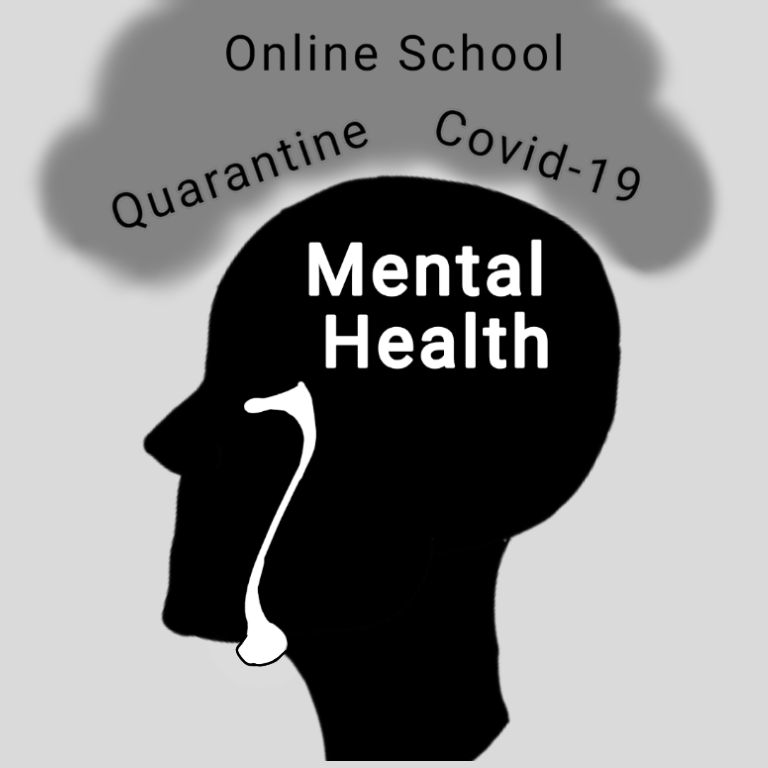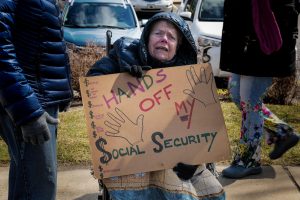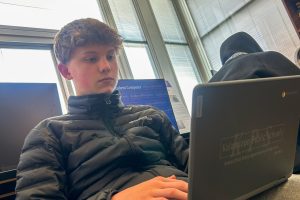Quarantine and online school has affected the mental health of students and teachers alike
November 19, 2020
Mental health issues in adolescents have been on the rise for years, as seen in multiple studies from sources like The Trevor Project and The World Health Organization. The question is, does quarantine and online school have an effect on a student’s mental health? It’s a resounding yes from two students and two teachers.
Merrie Crawford, a sophomore, said, “Quarantine has had both positive and negative effects on mental health depending on where I was staying. When I was at my mom’s, prior to summer vacation, it drove my anxiety and depression through the roof and made me angry at everyone all the time or just numb entirely. However, when I was at my dad’s for three months, my mental health improved drastically, and I made changes to my behavior and habits to ensure that I could be healthier and more positive, and that is still in effect today.”
Not only do people have to worry about themselves, but they’re also worrying about loved ones.
“Quarantine has worsened my anxiety to a point it hasn’t before,” sophomore Ally Wilson said. “Worrying about my own health on top of others is hard for me.”
On the topic of online school, Crawford remarks that going back to school has helped her mental health, but she’s worried about the learning aspect. Crawford explains that she’s not retaining much information, just turning assignments in. One thing Crawford really appreciates is the social-emotional learning session on Wednesdays.
Wilson, on the other hand, doesn’t enjoy the online learning experience.
“Online school has been an experience to say the least: it’s definitely hurt both my grades and my confidence in my abilities,” said Wilson.
Being cooped up behind a computer for most of the day means students need methods to address their other personal needs. Crawford describes her self-care system, which is the way that someone takes care of themselves to promote health.
“I’ve been doing things I enjoy, like reading and watching movies I love. I’ve been doing face masks and growing plants and stuff, and I use SEL days to take time for myself. I got put on anxiety meds and they’ve made a huge improvement in my mood and my thought process,” Crawford said.
According to the CDC, Over 7% of children aged 3-17 years, about 4.4 million kids, have diagnosed anxiety. Six in 10 of those 4.4 million received treatment.
Wilson said, “To keep my mood up I tend to draw, or play video games with friends or family! Both are things I really enjoy and being able to escape into a work I create or a world unlike ours can be refreshing.”
Crawford recommends as a coping strategy to remember that these struggles won’t last forever.
“Keeping a higher mindset is the key, even if it’s not positive because I know that’s hard sometimes. Finding light in the little things and making time for yourself and your happiness is very important,” Crawford said.
Wilson recommends doing activities that make you happy and spending time with friends, safely.
It’s not just students that are having a difficult time, teachers are too.
Rebecca Layton, the Sociology, Psychology, and Women’s Studies teacher said, “It [mental health in quarantine] has gone in phases. Since I live alone, isolation has been a major concern. I have had to work really hard at keeping in touch with people to keep depression and anxiety at bay. I felt MUCH better when I learned we were online. I was SUPER anxious about losing students or coworkers or infecting others.”
Despite her relief at being online, 100% virtual schooling has been hard for Layton.
“I do like that it is making us rethink what school really needs to look like. Do we need tests, do we need as much in-class time, do we need to add in SEL supports full time? For me, it feels like I am relearning to teach. While I know some students are doing better than others, I also think some new skills are being taught. Additionally, I would rather spend time hyping up students than burying them,” Layton said.
Self-care wise, Layton checks in with her friends, focuses on creative hobbies and sees a therapist every week.
“I have therapy every week, same as before this but now we do it online, I have been doing some crafting, cooking and redecorating. During the summer, I also went swimming every day that I could,” said Layton.
For coping skills, Layton recommends to avoid isolating, get outside, and make time to be screen-free.
“Basic self-care can sometimes be hard, but make sure you are sleeping enough, drinking water, eating veggies, etc. Reach out to people. Be creative.” Layton continued, “I think students having good organizational skills and a school plan is SUPER important to dealing with mental health right now,” she added.
As a teacher, she noticed that a lot of kids are very stressed.
“Things are very uncertain and everyone is having to learn new skills about time management and organization. Social isolation is getting to people.” Layton continued, “I have also seen some really positive changes. A lot of kids have had to adjust who they are as people — they are learning to be more flexible, to have more grace, to self-motivate, to be more confident.”
Politics, racial injustice, a virus and the election add even more stress. “As a middle-aged white woman, my anxiety, stress and mental health concerns are going to be different from those my students, especially my students in poverty or who are POC [people of color],” Layton said.
Julie Pelligrino-Hartman, Loy Norrix’s choir teacher, went into more detail about how POC have been affected.
She noted that the pandemic is traumatic, and people of color have racial trauma on top of that.
“One thing to keep in mind for students of color, not only are they dealing with the pandemic, being a marginalized identity is more on top of it.” Pelligrino-Hartman continued, “You may have a black student who is in an online class and they don’t learn very well with online learning, and then to top it off, the things that they’re learning about in class don’t reflect their culture, so it becomes ‘why would I go to class if none of this applies to me?’”
She noted that relationships are very important for learning and that being online makes it difficult for teachers to build relationships with students.
Pelligrino-Hartman continued, “On top of that, dealing with a president who can’t condemn white supremacy, and you’re seeing that from the top. I know that for me, as a marginalized person, I’ve now cried multiple times after reading news articles. It’s at least once a week, some news event is making me terrified because a person at the top doesn’t think a person like me should exist.”
Pelligrino-Hartman added that as someone who has struggled with mental health her entire life, at the beginning of the pandemic, there was a certain amount of relief because other people were seeing the world in the same way that she sees it.
“As a marginalized person who really cares and has dedicated my life in many ways to social justice and making the world a better place for everyone…” Pelligrino-Hartman continued, It’s been bad, pre-pandemic, it was bad already, and I think with the pandemic, it’s helped in some ways to open a lot of people’s eyes.”
She’s worried that after the election people will decide that their job is done.
“A lot of times people don’t have the time to dedicate to learning about issues that don’t affect them,” Pelegrino-Hartman said. “I want to know because I want the world to be a better place. A lot of people I know are in this space where we’re both hopeful, that finally, people are addressing these things that were problems the whole time, but also kind of hesitant because we know the whole process of becoming aware.”
The tips that Pelegrino-Hartman gave on dealing with mental health during quarantine included; therapy, self-care chores, to-do lists, showers, talking to friends regularly, memes, engaging interests, cleaning, Sun Salutations (yoga), and mindfulness exercises.
If you are struggling with mental health or thoughts of suicide here are some resources:
- The Trevor Project
- National Suicide Prevention Lifeline, Available 24 hours. Languages: English, Spanish. 800-273-8255












